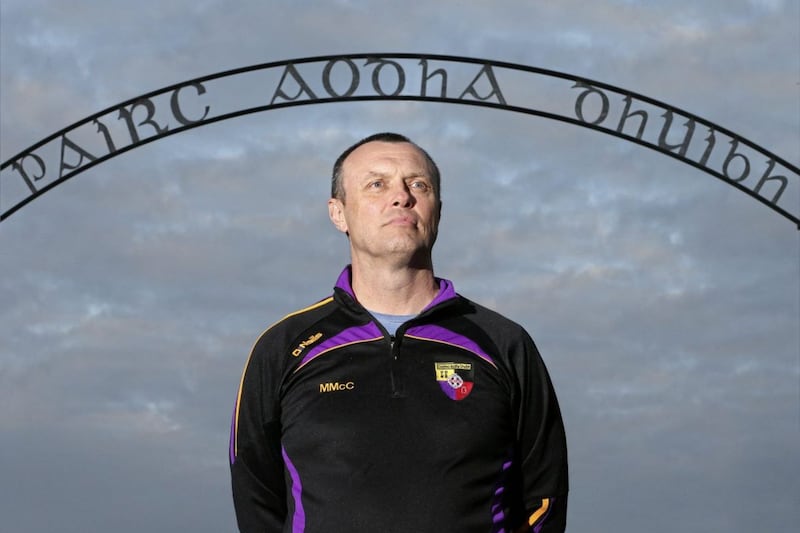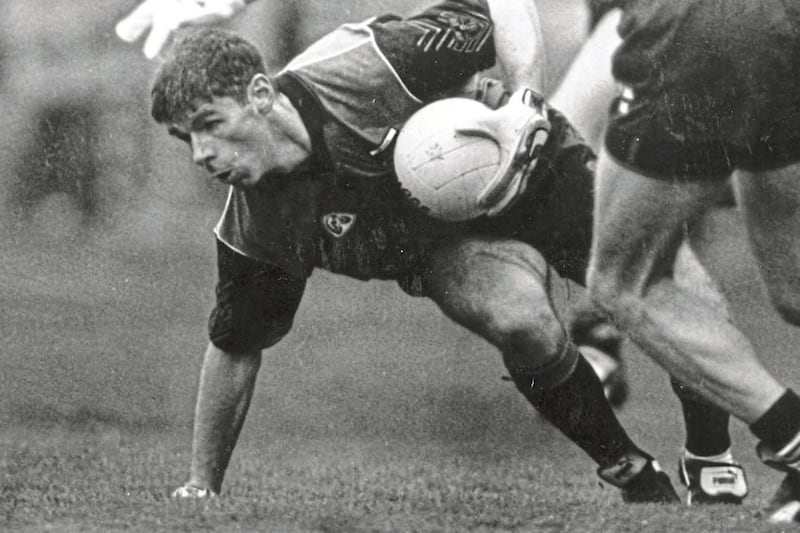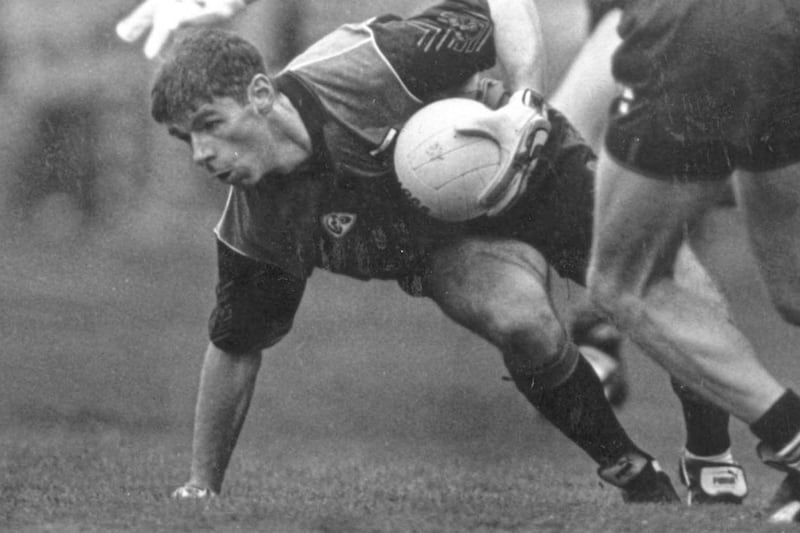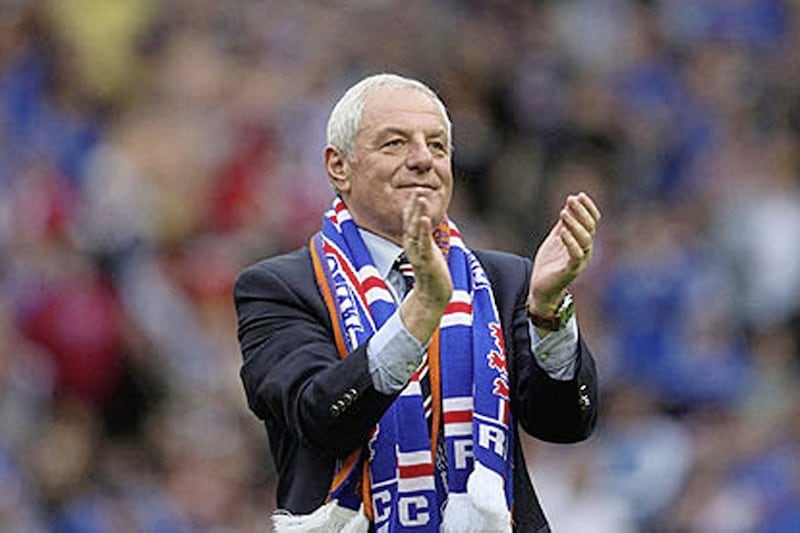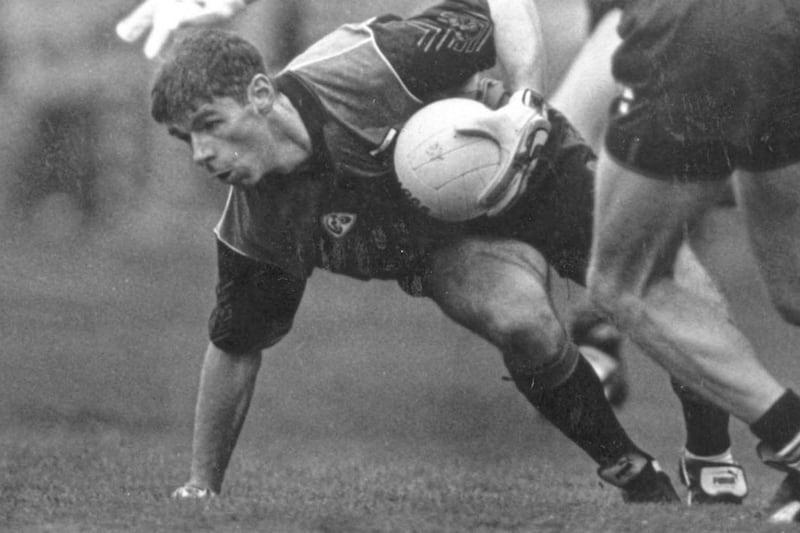ON ST PATRICK’S DAY the senior footballers of St Patrick’s Maghera and St Colman’s Newry should have been lining out in the Athletic Grounds in Armagh in the 11th Danske Bank MacRory Cup final between the schools.
However last week the Coronavirus and the directive from GAA Headquarters intervened to, at the very least, delay the final, a huge disappointment not only for the players, but also for all who had been looking forward to a modern day twist to one of the most intense rivalries in schools’ football.
Greg Blaney looks back on his three MacRory Cup finals of 1978, 1979 and 1981, games that laid the foundations for the Maghera v St Colman’s rivalry and produced its fair share of future stars.
“No fists, no boots, no elbows.”
Those words from Ray Morgan before every MacRory Cup game he played four decades ago still resonate with Greg Blaney.
“What he was trying to get across to us was that discipline was very important to the game, to the team. Using fists, boots or elbows increased your risk of being sent off and that was the worst thing that could happen.
“There was no thought about appeals or anything like that. If you got sent off it was letting the school down. It was letting the team down. And you would be called in by the Principal to answer for your actions.”
“Ray had won a MacRory Cup in St Colman’s about 15 years earlier. He understood the MacRory tradition in St Colman’s. His team photograph was on the wall. Every footballer in St Colman’s wanted to get in a team photograph on that wall.”
Greg Blaney’s father Sean had been in the team that created that tradition. Along with future Down All-Ireland medallists, Kevin Mussen and PJ McElroy, Sean had captained the first ever team to take the coveted trophy to Violet Hill in 1949.
A year later Sean became the first player to captain two winning teams. The MacRory tradition had begun in St Colman’s and the Blaney name was part of that tradition.
When Greg joined his father’s alma mater in late 1974 the St Colman’s name was already engraved nine times on the MacRory Cup. When he left seven years later, it had been added another five times and Greg had contributed to three of those victories.
“In my first year the school won its second Hogan Cup. I was a boarder and we went on supporters’ buses to all those games. It was a day out in the full sense, because you got to stop in a shop and buy sweets and that was a big thing for a boarder.
“But you got to see the matches, see the school winning. You just dreamed of being on that team, dreamed about getting your photo on the wall.”
St Colman’s beat St Patrick’s Maghera to win another title the following year. Then Blaney’s dream came true in 1978. He was a Fourth Year playing on the MacRory team.
“That would be very rare nowadays, but back then it was common enough. Paul Skelton from Derrytrasna was also a Fourth Year starting at half back, Back then a lot of lads left school at the end of Fifth Year and not that many stayed on to complete A Levels,” the future All-Ireland medallist and All-star adds.
“I was just thrilled to be part of it. Maghera didn’t register with me at that time. They were a new school really. 1976 was their first final and we beat them. Then they won in 1977. It wasn’t that we disrespected them. Ray wouldn’t have allowed that!
“Ray was thorough. He was a great coach. His training sessions were well organised, intense. He had us all fit, but he had us all playing good football.
“When it got to the knock-out stages of the MacRory, Friday mornings before games were spent in the Junior Rec. He went through the team outlining the responsibilities and I can still remember waiting my turn, waiting to hear what he expected from me.
“When he spoke at that meeting and in the changing room before the games, the hairs stood on the back of your neck. He was a great motivator and he knew how to work players by approaching them differently. He could put the arm around one player and shout at another.
“Coaching can be an art or a science. With Ray, it was both.
“Pete (McGrath) was there too. He came into the school and took us for the Rannafast and we won it. That was Pete established. He was a big part of the MacRory management from then on. He took plenty of the sessions. But Ray was the maestro to us.
“He would put the team up on the notice-board. I can still see his hand-writing. The team laid out in their positions and you went down there just to stare at it. If you saw your name up there, it was a big deal.”
Blaney wasn’t long establishing a reputation for himself in that team of 1977-78. He quickly became a permanent fixture and delivered 1-3 in the final against Maghera as St Colman’s won by 1-10 to 1-3. The goal opened a gap between the teams after 22 minutes.
“It wasn’t a great move or anything. I remember a high ball into the square and it broke to me and I scored. To be honest, I can’t remember a lot more about the final.
“Looking back it seemed to be easy enough for us. That is not dismissing Maghera. They were a tough team. They were very dogged. The football was tough. But we had a good team.
“Pat Donnan and John McCartan had won All-Ireland minor medals the year before. They were big leaders. John was at midfield with Sean McElroy, a nephew of PJ who played with my father. I see that he has a son in the present MacRory team … carrying on the tradition.
“But we had enough scores on the board and we didn’t seem to be under a lot of pressure coming to the end of it.”
Blaney had made his mark. He had lived up to the family name.
“Dad was pleased. I knew he was, but he never said it. Dad was someone who hid his pride. For me it was about getting the photograph on the wall.”
St Colman’s beat Carmelite Moate in the Hogan semi-final in Croke Park, but they were well beaten by St Jarlath’s Tuam in the final.
“We were a good enough team, but they were very good. They had a few Mayo minors and they won the All-Ireland minor that year. So we had no complaints”
UTV weather man Frank Mitchell (aka Frank McClorey) featured in that Hogan final but not the MacRory final.
“I remember Frank got sent off in a match either that year or the next. He might have missed the 1978 final for that. Frank was a good footballer and Ray would not have left him out of the MacRory final.
“He played well for us in the 1979 MacRory final against Maghera. If ’78 was a comfortable win for us, we were really hanging on the next year.
“I was in midfield with Declan Strain. Paul Skelton was wing half back again and scored three points. Liam McElhinney was a big player for Maghera.”
St Colman’s in fact edged home on a 0-7 to 0-5 score-line in wind-swept Casement Park and then issues surfaced.
The other three provinces had been dissatisfied with the fact that the MacRory Cup was an under 19 competition. As a compromise the Ulster Colleges’ Council had agreed to lower the MacRory to under 18 and a half.
However by the time the Hogan semi-finals came around, the age level had dropped to under 18 and that meant that Frank McClorey, Pat Maginn, John O’Hagan, Seamus Carr and team captain Peter Donnan were all ineligible for the Hogan.
The rows over the age difference between MacRory and Hogan rumbled on for another two decades before both ended up as under 18 and a half competitions as they are today.
“I don’t have any problem accepting that we were well beaten by St Jarlath’s in 1978 (before this situation arose), but you always wonder what would have happened had we had everyone available in 1979 and especially in my own year.”
Greg was one of the players to lose out after St Colman’s won again in 1981, again against Maghera. Greg was captain, following his father into St Colman’s folklore. They became the only father-son combination to lift the cup as captain in the 97 year history of the competition.
Greg Blaney had already won an All-Ireland under 21 medal (1979) and played senior for Down when he climbed the steps in Casement Park to collect the Cup from Br Kelly. Surely he knew by that stage that he was already a big name in football.
“To be honest, no. As a boarder I was in a different world, in a bubble. I would not have been in contact with what was going on outside. You got out to play for Down and you were back in that night and life went on.
“It didn’t appear that I got any brownie points with Ray anyway. He treated us all the same. It seemed that year that I was the same as I was when I first came into the team as a Fourth Year.
“We lost to Omagh in the quarter final in 1980. We had a good team. I don’t know what happened really. Maybe complacency. But I can still remember the feeling coming into the school the day after. I felt so low.”
Maghera went on to win the 1980 title, their second win and then they were back in the 1981 final, their sixth in succession.
“If they were relatively unknown in my early years in school, they certainly were the big team by the time I left and they kept going.
“The 1981 final was a tough encounter. Tommy Sands got our goal. Martin Rodgers, who died last year in USA, was a big player for us. His brothers had been on the 1975 winning team. A super player who made the Down team over the next couple of years before he went to the States.”
“Micky Doyle was our full-back that day. He went back to teach in the school and take teams, continued the tradition. He was a whole-hearted player, solid, committed and had a good football brain.”
Micky Doyle is part of the management team with Cathal Murray for this year’s final.
“I played with Cathal in Down teams later on. A great player as well. But he also came through St Colman’s, knows all about the tradition and he is continuing that tradition.”
The history books record a 1-3 to 0-5 win for St Colman’s in t1981, a fifth title in seven years, four of them achieved with wins over Maghera in finals.
“Maghera were now a force. Some great players in that team. They had Paddy Mackle, Martin Tully, Danny O’Kane, Paul John McCormack.
“I became great friends with Paul John at Queen’s. He and the rest of the Maghera boys would have talked in reverential tones about Adrian McGuckin, the preparation they put in, their attention to detail. The same way as we did about Ray and Pete.
“Those men were committed to their school, committed to every team they put out. Ray carried on a tradition that he had been part of as a player. Adrian established a similar tradition in Maghera.”
“The schools became serious rivals during my time and that lasted for another 20 years. It has surprised me that they have not played against each other in a final since 1998.”
“The rivalry is still there. But there will always be respect too.”
Footnote : On the losing Maghera team in 1981 was Dermot McNicholl, already a MacRory winner with 1-1 in the 1980 final. Dermot went on to win three more MacRory medals, becoming the most decorated player in MacRory history.
He is the only player to play in five finals and also just the second to captain two winning teams (1983 and 1984). The first of course was Sean Blaney.


